Bb5.9
The beginning of line Bb5 may have corresponded to the
first day after the completion of a synodic Venus cycle.
|
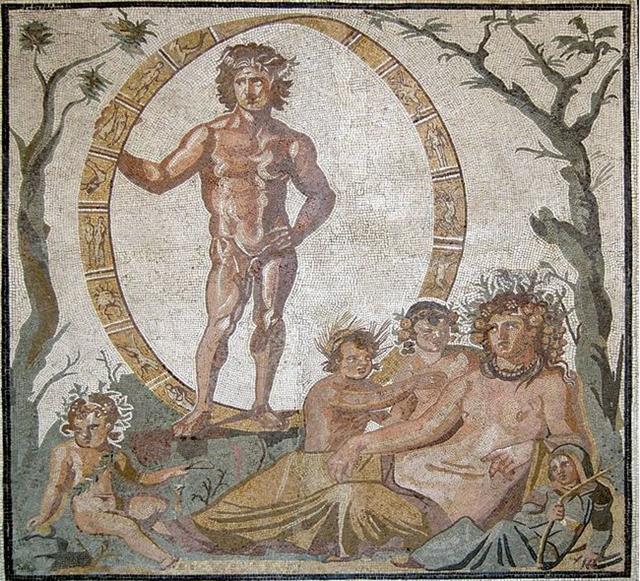
 |
|
Synodic
cycles: |
|
Mercury |
115.88
→
116 = 4 * 29 |
|
Venus |
583.92
→ 584 = 3 * 116 + 8 * 29½ |
|
Earth |
π * 116
→
364.24 |
|
Mars |
779.96
→ 780 = 584 + 4 * 49 |
|
Jupiter |
398.88
→ 399 = 584 - 185 |
|
Saturn |
378.09 |
|
Uranus |
369.66
→ 370 = 584 -
214 |
This
can be guessed from the glyph numbers counted from
Ba1-1. And if this interpretation is correct, then - in a
well-ordered world (cosmos) - it would be necessary to
count also to
5 as in
the number for the relevant line on side b of the
tablet.

Notice the connection depicted between
the Tea-pot (→
'the Precious Vase'
→ Kiore
→ kuhane) and Venus.
.jpg)
|
Jan 9 |
10 |
11 (360 + 16) |
12 |
13 (378 → Saturn) |
 |
 |
 |
 |
 |
|
Bb5-1
(584 + 1) |
Bb5-2 |
Bb5-3
(166) |
Bb5-4 |
Bb5-5
(589) |
|
Ki te manu gutu
roaroa |
kua hahata ia te vaha
ona |
mai tae tanu
hia te
tau moko |
e manu rere |
ki te mauga |
|
Gutu. 1.
Lips, mouth,
beak, snout (goutu); gutu ahu,
swollen lip; gutu hiti, thick
lip; gutu mokomoko, pointed lip;
gutu no, vain words;
gutu pakapaka, scabbed lips; gutu
raro, lower lip; gutu ruga,
upper lip. Gutugutu, snout. P
Pau.: gutu, lip, beak, bill.
Mgv.: gutu, the chin, the mouth
of a fish. Mq.: nutu, beak,
snout. Ta.: utu, lip, mouth,
beak, snout. Gutupiri,
attentively. Gututae,
attentively; gututae mekenu, a
small mouth. Gututika, tattoing
on the lips. 2. Pau.: Gutuafare,
to save, to economize. Ta.: utuafare,
family, residence. 3. Pau.: Guturoa,
to grimace, to pout. Mgv.: guturoa,
to grimace. Churchill.
Roa.
Long: haga roa, long bay,
wide beach; ara roa râkei, wide,
neat path. Roaroa, long, tall,
far, distant: tagata roaroa, tall
man; kaiga roaroa, distant land;
roaroa tahaga, middle finger.
Vanaga. Long, large, extent; roaroa,
to grow, height; mea roaroa, a
long while; roaroa tahaga, middle
finger; roaroa ke, infinite (time
and space); roroa, far, distant,
thin, to grow tall; tagata roroa,
giant; roroa ke, immense;
arero roroa, to rapport, to tell;
vanaga roroa, to chatter, babbler;
vare roroa, driveller; hakaroa,
to lengthen, to defer; hakaroaroa,
to lengthen, to develop; hakaroroa,
to extend, prolong, defer, lengthen;
roaga, distance, extent, size,
length, distant, long. Churchill.
He-hahata te ava o te
henua, a crevice opened in the
ground. Vanaga.
Tanu.
To cover something in the
ground with stones or soil; to bury a
corpse; tanu kopú, to bury
completely; this expression is mostly
used figuratively: ka-tanu kopú te
vânaga tuai era, ina ekó mana'u hakaou,
forget those old stories, don't
think of them again. Vanaga. To bury, to
plant, to sow seed, to inter, to
implant, to conceal; tagata tanukai,
farmer; tanuaga, burial;
tanuaga papaku, funeral; tanuga,
plantation; tanuhaga, funeral,
tomb. P Pau.: tanu, to cultivate.
Mgv.: tanu, to plant, to bury.
Mq.: tanu, to plant, to sow. Ta.:
tanu, to plant, to sow, to bury.
Churchill.
Moko. 1. Lizard; moko
manu uru,
figurine of a lizard (made of wood).
2. To throw oneself on something, to
take quickly, to snatch; to flee into
the depths (of fish); tagata moko,
interloper, intruder, someone who seizes
something quickly and swiftly, or
cleverly intrudes somewhere; ka-moko
ki te kai, ka-moko, ka-aaru, quickly
grab some food, grab and catch. 3. To
throw oneself upon someone, to attack:
he-moko, he-reirei, to attack and
kick. 4. Moko roa: to make a long
line (of plantation); moko poto,
to make a short line. 5. Ihu moko;
to die out (a family of which remains
only one male without sons); koro
hakamao te mate o te mahigo, he-toe
e-tahi tagata nó, ina aana hakaara, koîa
te me'e e-kî-nei: ku-moko-á te ihu o te
mahigo. when the members of family
have died and there remains only one man
who has no offspring, we say:
ku-moko-á te ihu o te mahigo; to
disappear (of a tradition, a custom),
me'e ihu moko o te tagata o te kaiga
nei, he êi, the êi is a
custom no longer in use among the people
of this island. Vanaga. 1. Lizard. P
Pau., Mgv., Mq.: moko, id. Ta.
moó, id. 2. To stun, to be dizzy. PS
Sa.: mo'o, to be surprised.
Hakamoko, to accomplish. Mokohi,
grain, full-grown berry (mokoi);
mokohi haraoa, grain. Mgv.:
mokohe, food. Mokoimokoi,
heart T, kidney. Mokomoko, sharp,
pointed, slender, cape, headland;
gutu mokomoko, pointed lips.
Churchill. Mgv.: mokora, a duck.
Ta.: moora, id. Churchill.
... A une certaine
saison, on amassait des vivres, on
faisait fête On emmaillotait un corail,
pierre de défunt lezard, on l'enterrait,
tanu. Cette cérémonie était un
point de départ pour beacoup d'affaires,
notamment de vacances pour le chant des
tablettes ou de la priére, tanu i te
tau moko o tana pure, enterrer la
pierre sépulcrale de lézard de sa prière
...
Maúga. 1. Last;
aga maúga o te Ariki o Hotu Matu'a,
King Hotu Matua's last work. 2. Hill,
mountain. Mouga, moúga. Last;
vânaga moúga o te Ariki O Hotu Matu'a,
the last words of King Hotu Matu'a.
Vanaga. Mauga kore, impalpable.
Mouga. 1. Enough, that's all, at
last. 2. Mountain, ridge of hills;
mouga iti, hillock; tua mouga,
mountain top; hiriga mouga;
hillside, declivity, slope. P Pau.:
mahuga, mountain. Mgv.: mou,
maga, mountain. Mq.: mouna,
mouka, peak or crest of a
mountain. Ta.: maua, moua,
mountain. 3. Extinction, end,
interruption, solution; te mouga o te
hiriga, end of a voyage; pagaha
mouga kore, without consolation. 4.
To get. Churchill. |
|
ALUDRA (Virgin) =
η
Canis Majoris
(111.1),
PROPUS = ι Gemini (111.4),
GOMEISA (Water-eyed) = β Canis Minoris
(111.6)
*70.0 = *111.4 - *41.4 |
ρ Gemini
(112.1),
Eskimo Nebula = NGC2392 Gemini
(112.2)
ANTARES (α Scorpii) |
Al Dhirā'-5
(Forearm) /
Punarvasu-7 (The
Two Restorers of Goods) /
Mash-mashu-Mahrū-10 (Western One of the
Twins)
CASTOR (Beaver) = α Gemini (113.4)
*113.4 = *41.4 + *72.0 |
ANA-TAHUA-VAHINE-O-TOA-TE-MANAVA-7
(Pillar for Elocution)
υ Gemini (114.0),
MARKAB PUPPIS = κ Puppis
(114.7), ο Gemini (114.8),
PROCYON = α Canis Minoris
(114.9) |
α Monocerotis (115.4),
σ Gemini (115.7)
*74.0 = *115.4 - *41.4 |
|
...
Originally the highly born family of the
Sun, Moon, and stars dwelt in a cave on
the summit of Maunga-nui, Great
Mountain, in the ancient homeland. They
were not at all comfortable in their
gloomy home for they could not see
distinctly and their eyes watered
constantly. After the Sky-father had
been elevated to his present eminence
Tane decided that the celestial
family would be happier in the sky,
where they would serve the double
purpose of ornamenting the naked body of
Rangi and giving light to the
Earth-mother. Since Papa had
already been turned with her face toward
the Underworld it is difficult to see
how she would benefit by the
illumination ... |
|
July
10 (191) |
11 |
12 (6
* 29½ + 16) |
13 |
14
(*115) |
One of the 5 points of the Venus star was at AD
1905-04-27 (117, *27) we can see in the illustration above.
By using the computer program Cartes du Ciel
it was possible for me to here find Venus
located between the
Sun and Hamal, with Jupiter not far away at the
other side of the Sun:
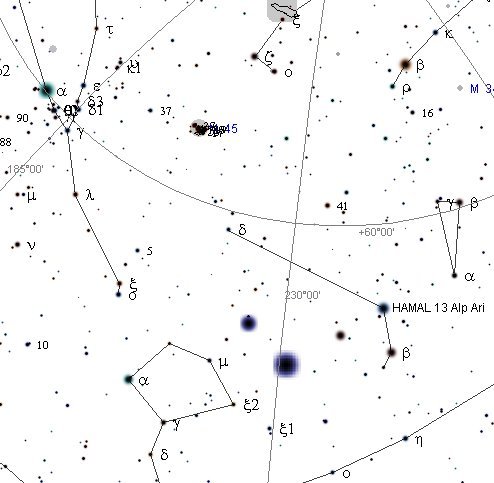
Below at left is the head of Cetus and we can
also see Taurus higher up to the left.
365 / 5 = 73, and should we use the Julian day
(84) for the northern spring equinox instead of
the Gregorian (80), then number *73 (instead of *77)
would represent
Φ Gemini at the Full Moon:
|
Jan 1 |
15 (380) |
16 (365 + 16) |
 |
 |
 |
|
Bb5-6 (590 = 20 * 29½) |
Bb5-7 |
Bb5-8 (171) |
|
kua kake ko
kahini |
kua kake o
manava te kahini |
kua kake
ko Reha
- kua kake ko
Apareha |
|
Manava.
Abdomen, belly, (fig.) affection,
sensitivity, feelings; manava
more, grief; manava mate,
infatuated, in love (with
something); ku-ká-á te manava,
flared up, infuriated, irate;
he-kava te manava, offended, to
turn sour, embittered. See also
hatu (manava hatu).
Vanaga. Belly, abdomen, entrails,
interior; manava ahuahu,
indigestion; manava hanohano,
high tempered, to annoy; manava
itiiti, frugal; manava
karavarava, colic; manava
mate, to be in ecstasy, passion,
intensity of affection; manava
more, to desolate; manava
ninihi, colic; manava nuinui,
appetite; manava pagaha,
affected, to complain; manava
rakerake, bad character;
manava riri, anger; manava ru,
complaint; manava ruru,
alarm, consternation, emotion,
swoon; manava tagi, eager;
manava tiha, out of breath;
manava topa ki raro, humble, to
humiliate; manava vai,
simpleton, to have dull senses;
meniri ko manava, little finger;
kakari manavai, waist;
manava eete, to shudder, to
tremble, to astonish; anger, fright,
consternation; manava eete ki te
mau mea ananake,
susceptible; eete manava,
affected, moved; manava pohi,
hasty, cruel, penitent; contrition,
indignation; kokoma hanohano
manava pohi, to abhor; manava
pohi nunui ke, implacable. P
Pau.: manava, the interior,
affected, touched. Mgv.: manava,
the belly, spirit, conscience. Mq.:
menava, respiration, pulse.
Ta.: manava, belly, entrails.
Churchill.
Koreha. 1.
Sea eel; several sorts are
distinguished: koreha puhi.
haoko, migo, tapatea. 2.
Koreha o raro o te oone,
earthworm; koreha henua,
snake. Vanaga. Eel, worm; koreha
heenua, worm. Churchill.
Kapa. Mgv.: a song for the
dead, chant. Mq.: kapa, a
heathen song. Mgv.: aka-kapakapa,
an eager desire balked by timidity.
Ta.: apaapa, to flutter the
wings. To.: kabakaba, id.
Ma.: kapakapa, to flutter.
Churchill. Tu.: Kapakapa,
portion, particle. Ta.: apaapaa,
fragment, bit, chip. Churchill. In
Polynesia gliding flight is
expressed by lele, flight on
flapping wing by kapa. In
Nuclear Polynesia kapa does
not pass into the wing sense except
through the aid of a composition
member kau. In Samoan 'au
we find this to mean a stalk, a
handle; in reference to the body its
sense as that of some projecting
member is exhibited in 'aualuma
(the 'au in front) as a very
delicate euphemism for the penis. So
'apa'au would mean literally
the projecting member that flaps.
Churchill 2. |
|
RIGHT ASCENSION DAYS AT THE FULL
MOON: |
|
Mash-mashu-arkū-11 (Eastern One of
the Twins)
κ Gemini (116.1),
POLLUX = β Gemini
(116.2), π Gemini (116.9) |
AZMIDISKE (Little Shield) =
ξ
Puppis
(117.4)
*76.0 = *117.4 - *41.4 |
Φ Gemini (118.4)
*77.0 = *118.4 - *41.4 |
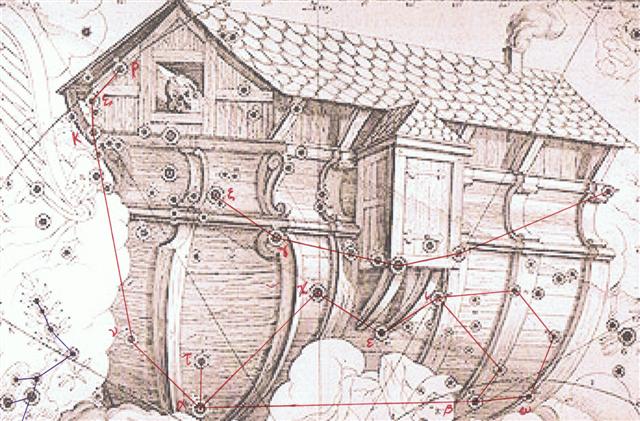 |
|
July 15 (196) |
16 (181 + 16 = 117 + 80) |
17 (*118 = *472 / 4) |
In Roman times the (northern) summer
solstice had coincided with the Sun at the Navel of
Castor (ω
Gemini):
|
Jan 17 (355 + 27 = 382) |
18
|
19 (384) |
|
Solstice (382 - 27 = 355) |
'Dec 22 (356 = 382 - 27) |
23 |
|
HELIACAL STARS: |
|
ε Pavonis, θ Sagittarii (302.3),
γ Sagittae (302.5), μ Pavonis
(302.7) |
τ Aquilae
(303.8) |
20h (304.4)
304.4 = 118.4 + 186.0
η Sagittae (304.2),
δ Pavonis (304.4)
*263.0 = *77.0 + *186.0 |
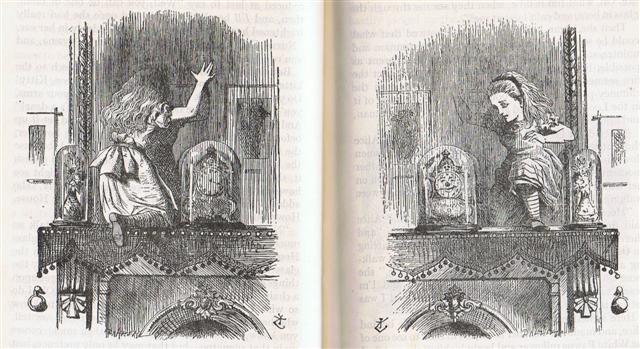
Alice exhibited
her upraised right arm with
empty hand when pushing on from
the night side, and at her
entrance into the side of the
light she had turned her hand
into a convex form, a pattern
opposite to that of the Mad
Hatter::
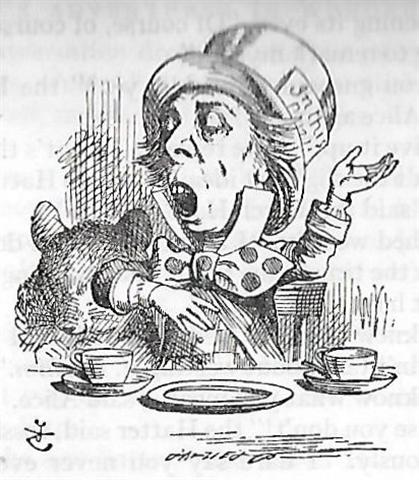
'Twinkle, twinkle, little
bat!' // How I wonder what you're at!' |
 |
 |
 |
|
Bb5-9 (172 → Solstice) |
Bb5-10 |
Bb5-11
(595) |
|
mai tae
tuki to haga - mai tae oho te
rima |
mai tae
te vere ki te henua - ko te rima
e oho ki to kava |
eko te
tagata kua hakahonui |
|
Rima. 1. Hand,
also, but improperly, fingers,
forearm; te ko mu'a o te
rima, palm of the hand;
te ko tu'a o te rima, back
of the hand; rima hakaturu,
generous, liberal,
munificent; tagata rima pu'a,
helper; rima hakakau,
generous hands, open-handed
person; rima matu'a neanea,
thumb. 2. Fifth; e-rima,
ka-rima, five. Vanaga. 1.
Five. P Mgv., Ta.: rima,
id. Mq.: ima, id. 2. Arm,
hand; rima atakai,
obliging, kind, generous, a
gift, rima tuku, elbow,
rima omo, infidelity,
faithless, unfaithful, rima o
te kahu, sleeve, kakari
rima, wrist. P Pau.: rima,
hand, arm. Mgv.: rima,
hand, arm, paw, finger. Mq.:
ima, hand, arm. Ta.: rima,
arm, hand, finger.
Rimahakaviriviri, fist, to
clench the fist, a blow of the
fist. Rimahati,
one-armed. Rima ko manaroa,
little finger T. Rimamatua
neanea, thumb. Rimaroaroa
tahaga, middle finger T.
Rimatitiri, to walk with the
hands behind the back.
Rimaruru, to clasp hands.
Rimatuhi henna (?) index
finger T. Rimatuhi a hana,
finger ring T (? ring finger).
3. To lead into error;
rimaetua, supernatural, Mq.:
imaima, that which
returns after a man's death,
Ta.: rimaatua, plague,
dissension, mortal illness.
Churchill.
Honui. 1.
Person worthy of respect, person
of authority. 2. Livelihood,
heirloom, capital; ka
moe koe ki toou hônui, you
must marry to ensure your
livelihood (said to a little
girl); he hônui mo taaku
poki, this is the heirloom
for my son. Vanaga. Great (hoonui);
honui, chief T.;
tagata hoonui, personage;
hakahonui, to praise, to
commend. Churchill. |
|
RIGHT ASCENSION DAYS AT THE FULL
MOON: |
|
DRUS
(Hard)
= χ Carinae
(119.9) |
ω Cancri
(120.2) |
8h (121.7)
χ
Gemini (121.0),
NAOS (Ship) =
ζ
Puppis
(121.3) |
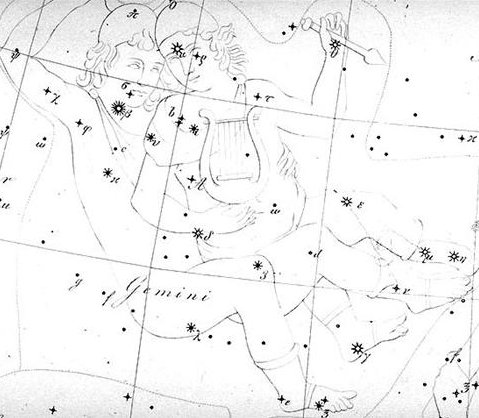 |
|
July 18
(172 + 27) |
19 (200) |
20 |
|
Solstice |
'June 22 (200 - 27 = 173) |
23 |
|
MAY 15 (500) |
16 (136 = 200 - 64) |
17 |
|
... As has
already been mentioned, the
Delphians worshipped Dionysus
once a year as the new-born
child, Liknites, 'the
Child in the Harvest Basket',
which was a shovel-shaped basket
of rush and osier used as a
harvest basket, a cradle, a
manger, and a winnowing-fan for
tossing the grain up into the
air against the wind, to
separate it from the chaff. The
worship of the Divine Child was
established in Minoan Crete, its
most famous early home in
Europe. In 1903, on the site of
the temple of Dictaean Zeues -
the Zeus who was yearly
born in
Rhea's cave at Dicte near
Cnossos, where Pythagoras spent
'thrice nine hallowed days' of
his initiation - was found a
Greek hymn which seems to
preserve the original Minoan
formula in which the
gypsum-powdered, sword-dancing
Curetes, or tutors, saluted the
Child at his birthday feast. In
it he is hailed as 'the Cronian
one' who comes yearly to Dicte
mounted on a sow and escorted by
a spirit-throng, and begged for
peace and plenty as a reward for
their joyful leaps ...
 |
And at Christmas Eve would have had the star
Regor
(Roger backwards) at the
Full Moon:
... Gamma Velorum
(γ Vel,
γ Velorum) is a star
system in the constellation Vela. At
magnitude +1.7, it is one of the
brightest stars in the night sky. It has
the traditional names Suhail and
Suhail al Muhlif, which
confusingly also apply to Lambda Velorum
[γ ↔ λ].
It also has a more modern popular name
Regor, which was invented as a
practical joke by the Apollo 1 astronaut
Gus Grissom for his fellow astronaut
Roger Chaffee. Due to the exotic nature
of its spectrum (bright emission lines
in lieu of dark absorption lines) it is
also dubbed the 'Spectral Gem of
Southern Skies' ...
...
We also find Al
Jummaizā, their Sycamine, although
some say that this should be Al
Ghumaisā, the Dim, Watery-eyed, or
Weeping One; either from the fact that
her light [that of Procyon] was dimmer
than that of her sister Al Shi'rā
[Sirius], or from the fable connected
with Suhail and his marriage to
Al Jauzah and subsequent flight,
followed by Al Shi'rā below the Milky
Way, where she remained, the other
sister, Al Ghumaisā, being left in tears
in her accustomed position, or it may be
from a recollection of the Euphratean
title for Procyon, - the Water-dog.
Bayer wrote the word
Algomeiza; Riccioli, Algomisa
and Algomiza; and others,
Algomeysa, Algomyso,
Alchamize, etc. Thus the Two Dog
stars were the Arabs' Al Ahawāt al
Suhail, the Sisters of Canopus.
Still another derivation of the name is
from Al Ghamūs, the Puppy; but
this probably was a later idea from the
Romans ...
|
JAN 20 |
21 |
22 |
23 (388) |
24 |
25 |
26 |
|
X-mas Eve |
'Dec 25 |
26 (177 + 183) |
27 |
28 |
29 (3 * 121) |
30 (348 + 16) |
 |
 |
 |
 |
 |
 |
 |
|
Bb5-12 (175) |
Bb5-13 |
Bb5-14 (177) |
Bb5-15 |
Bb5-16 (600) |
Bb5-17 |
Bb5-18 (181) |
|
mai
tupu ona poporo |
i
haga o tere |
ko te
manu mata e toru |
kua
ui ki te maitaki |
kua
vero
hia ia |
ko te
tagata ra |
- |
|
Tupu. 1.
Shoot, sprout, bud; to
sprout, to bud. 2.
Pregnant: vî'e tupu
(o te poki); to be
conceived (of fetus in
its mother's womb):
he-tupu te poki i roto i
te kopú o toona matu'a.
Vanaga. To grow, to
sprout, to germinate, to
come forth, to conceive,
pregnant, germ; mea
tupu, plant; tupu
ke avai, of rapid
growth; tupu
horahorau,
precocious; hakatupu,
to produce, to stimulate
growth, to excite. P
Pau.: fakatupu,
to raise up, to create.
Mgv.: tupu, to
grow, to conceive, to be
pregnant. Mq.: tupu,
to grow, to sprout, to
conceive. Ta.: tupu,
to grow, to sprout.
Churchill. Mgv.: Tupu,
the best or worst, used
of men or of bad
qualities. Sa.: tupu,
king. Ma.: tupu,
social position,
dignity. Churchill.
Ona. 1. Ta.:
ona, he, she.
Sa.: ona, his,
hers. Ma.: ona,
id. 2. Ta.: ona,
rich. Mq.: ona,
id. Churchill.
Tere. 1. To
run, to flee, to escape
from a prison. 2. To
sail a boat (also:
hakatere); tere
vaka, owner of a
fishing boat. 3.
(Deap-sea) fisherman;
tere kahi, tuna
fisherman; tere
ho'ou, novice
fisherman, one who goes
deap-sea fishing for the
first time. Penei te
huru tûai; he-oho te
tere ho'ou ki ruga ki te
hakanonoga; ana ta'e
rava'a, he-avai e te
tahi tagata tere vaka i
te îka ki a îa mo
hakakoa, mo iri-hakaou
ki te hakanonoga i te
tahi raá. The
ancient custom was like
this: the novice
fisherman would go to a
hakanonoga; if he
didn't catch anything,
another fisherman would
give him fishes to make
him happy so he'd go
again one day to the
hakanonoga (more
distant fishing zones
where larger fishes are
found). Vanaga. To
depart, to run, to take
leave, to desert, to
escape, to go away, to
flee, fugitive, to sail,
to row, to take refuge,
to withdraw, to retreat,
to save oneself;
terea, rest, defeat;
tetere, to beat a
retreat, to go away,
refugee; teretere,
to go away, hurrah;
hakatere, to set
free, to despatch, to
expel, to let go, to
liberate, to conquer,
helmsman; terega,
departure, sailing;
teretai, a sailor.
Churchill. |
|
HELIACAL STARS: |
|
SHANG WEI (Higher Guard)
=
κ
Cephei
(305.2),
θ
Sagittae (305.4),
TSEEN FOO (Heavenly
Raft) =
θ
Aquilae (Ant.)
(305.6), ξ Capricorni
(305.8)
*264.0 = *305.4 - *41.4 |
TSO KE (Left Flag) =
ρ
Aquilae
(306.3) |
GREDI (Goat) =
α
Capricorni
(307.2),
σ
Capricorni (307.5),
ALSHAT (The Sheep) =
ν
Capricorni
(307.9) |
Al
Sa’d al Dhabih-20 (Lucky
One of the Slaughterers)
/
Ox
/ Heard Boy (Buffalo)
DABIH =
β
Capricorni
(308.0),
κ
Sagittarii (308.1),
SADIR (Hen's Breast) =
γ
Cygni (308.4),
PEACOCK =
α
Pavonis
(308.7)
*267.0 = *308.4 - *41.4 |
OKUL =
π
Capricorni
(309.6),
BOS =
ρ
Capricorni
(309.9)
ARNEB (α Leporis)
MINTAKA (δ Orionis) |
ο
Capricorni (310.2),
θ
Cephei (310.5)
HEKA (λ
Orionis)
ALNILAM (ε Orionis) |
ROTTEN MELON =
ε
Delphini,
φ
Pavonis (311.2),
η
Delphini (311.4),
ζ
Delphini,
ρ
Pavonis (311.7)
PHAKT (α
Columbae)
ALNILAK (ζ
Orionis)
*270.0 = *311.4 - *41.4 |
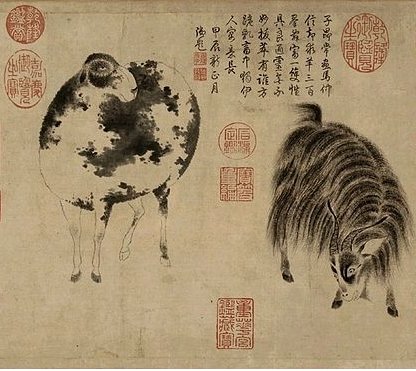 |
|
RIGHT ASCENSION DAYS AT
THE FULL MOON: |
|
ρ
Puppis (122.0),
HEAP OF FUEL =
μ
Cancri
(122.1),
ζ
Monocerotis (122.3), ψ
Cancri (122.6),
REGOR (Roger backwards)
=
γ
Velorum
(122.7) |
TEGMINE (The Cover) =
ζ
Cancri
(123.3) |
AL TARF (The End) =
β
Cancri
(124.3)
RAS ALGETHI (α Herculis) |
χ
Cancri (125.2),
BRIGHT FIRE =
λ
Cancri (125.4)
*84.0 = *125.4 - *41.4 |
AVIOR =
ε
Carinae (126.4),
φ
Cancri (126.8)
*85.0 = *126.4 - *41.4 |
ο Ursae Majoris (127.4)
*86.0 = *127.4 - *41.4 |
Pushya-8 (Nourisher)
υ
Cancri (128.1), θ
Cancri (128.2) |
 |
Although according to the era of
Bharani the Sun would at
that time have
been in day *260 (when
counting from "March 25).
The Beehive in the center of
Cancer constellation might have
induced
Metoro to advice Bishop
Jaussen to count (hia):


 |
 |
 |
 |
 |
 |
 |
|
Bb5-19 |
Bb5-20 (183) |
Bb5-21 |
(370 / 2) |
Bb5-23 |
Bb5-24 |
Bb5-25 |
|
kua oho ia - ki tona
maro |
mai tae tupu
hia - mai tae
hanau
hia - koia ra
kua oho ki tona mea
hakavari oona - e
tahina - e tahina
oona ra - mai tae e
oho ki te vaha toga
- kua huki ra te
tagata |
|
Vari. 1.
Menstruation, period
(also: tiko).
2. To tack, to veer
(nautical);
ku-vari-mai-á te
miro, the boat
arrives, have veered
[around Rano Kau].
Vanaga. About,
circumference, to
turn in a circle;
hakavari,
pliant, to bend,
square; varivari,
about, to go around;
vavari, a
garland;
varikapau,
circumference, to
surround, a compass,
to admire; hiriga
varikapau, to go
in a ring; pa
varikapau, to
close in;
varitakataka (vari-taka
3) to surround.
Churchill. Pau.:
Vari, marsh,
mire, dirt. Ta.:
vari, dirt, mud.
Rar.: vari,
mud. Churchill.
Mgv.: Vari,
paste well diluted.
Mq.: vaivai,
to dilute, to thin.
Ha.: waliwali,
soft, pasty.
Churchill. |
|
ROTANEV =
β
Delphini,
ι
Delphini (312.3),
τ
Capricorni (312.6),
κ
Delphini (312.7),
SVALOCIN =
α
Delphini,
υ
Capricorni,
υ
Pavonis (312.8) |
μ²,
μ¹
Oct. (313.2),
DENEB CYGNI (Tail of
the Swan) =
α
Cygni
(313.5),
β
Pavonis (313.6),
δ
Delphini (313.8) |
Al Sa’d al Bula'-21
(Good Fortune of the
Swallower)
/
Dhanishta-24 (Most
Famous)
/
Girl-10 (Bat)
YUE (Battle-Axe)
=
ψ
Capricorni
(314.3),
GIENAH CYGNI =
ε
Cygni,
η
Cephei (314.5),
γ
Delphini (314.6),
σ
Pavonis (314.7),
ALBALI =
ε
Aquarii
(314.8)
BETELGEUZE (α
Orionis) |
BATEN ALGIEDI (Belly
of the Goat) = ω
Capricorni
(315.8) |
μ Aquarii (316.0) |
ε Equulei (317.8) |
No star listed (318) |
|
Āshleshā-9 (Embrace)
/
Willow-24 (Stag)
π¹
Ursa Majoris,
δ
HYDRAE (129.6),
AL MINHAR AL SHUJĀ
=
σ
Hydrae, MUSEIDA =
π²
Ursae Majoris
(129.9)
RAS ALHAGUE (α
Ophiuchi) |
Al Nathrah-6 (Gap)
BEEHIVE (Exhalation
of Piled-up Corpses)
= ε Cancri,
η Pyxidis (130.4),
XESTUS = ο Velorum
(130.5), ζ Pyxidis
(130.7),
ASCELLUS BOREALIS =
γ Cancri,
β Pyxidis (130.9)
*89.0 = *130.4 -
*41.4 |
Extended Net-26a
(Ox) /
Arkū-sha-nangaru-sha-shūtu-12
(Southeast Star in
the Crab)
η
Hydrae (131.0),
ASCELLUS AUSTRALIS =
δ
Cancri (131.4),
KOO SHE (Bow and
Arrow) =
δ
Velorum
(131.6),
α
Pyxidis (131.8),
ε
Hydrae (131.9)
*90.0 = *131.4 -
*41.4 |
ι Cancri (132.0),
ρ Hydrae (132.4)
*91.0 = *132.4 -
*41.4 |
γ Pyxidis (133.6) |
ζ
Hydrae (134.1),
ρ
Cancri (134.2),
ζ
Oct.
(134.3), ο Cancri
(134.6), δ Pyxidis
(134.9) |
ACUBENS = α Cancri,
TALITHA BOREALIS = ι
Ursae Majoris
(135.0), σ Cancri
(135.2), ρ Ursa
Majoris (135.6) |
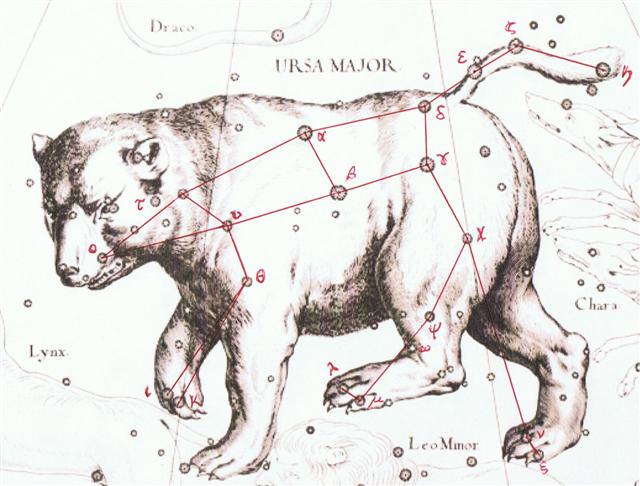 |
Possibly Metoro wished the
Bishop to arrive at day *314
(April 19) when
Betelgeuze would culminate
(at 21h according to the era
of rongorongo).
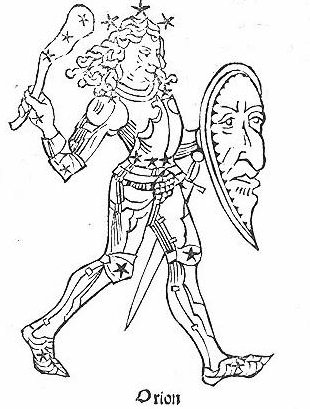
... When
this tremendous task had
been accomplished Atea
took a third husband,
Fa'a-hotu, Make
Fruitful. Then occurred a
curious event. Whether
Atea had wearied of
bringing forth offspring we
are not told, but certain it
is that Atea and her
husband Fa'a-hotu
exchanged sexes. Then the
[male] eyes of Atea
glanced down at those of his
wife Hotu and they
begat Ru. It was this
Ru who explored the
whole earth and divided it
into north, south, east, and
west ...
 |
 |
 |
 |
 |
 |
 |
 |
|
Bb5-26 |
Bb5-27 |
Bb5-28 |
Bb5-29 (192) |
Bb5-30 |
Bb5-31 |
Bb5-32 |
Bb5-33 |
|
mai tae oho te
tagata - ki to
maro - e tagata
ui ki to maitaki |
ihe tamaiti |
kua hua koia |
e kua oho te
rima - ki te vai
- ko te vai kua
oho ki te mea
maú |
ko te tagata kua
oho - ki te
huaga o te
poporo |
e ariki ra
|
|
Ui.
To ask. Vanaga.
Û'i.
To look, to look
at (ki);
e-û'i koe!
look out!
Vanaga.
Ui.
1. Question, to
interrogate, to
ask (ue).
Uiui,
to ask
questions. 2. To
spy, to inspect,
to look at, to
perceive;
tagata ui,
visitor.
Churchill.
Tama.
1. Shoot (of
plant), tama
miro, tree
shoot; tama
tôa, shoot
of sugarcane. 2.
Poles, sticks,
rods of a frame.
3. Sun rays. 4.
Group of people
travelling in
formation. 5. To
listen
attentively
(with ear,
tariga, as
subject, e.g.
he tama te
tariga);
e-tama rivariva
tokorua tariga
ki taaku kî,
listen carefully
to my words.
Tamahahine,
female.
Tamahine (=
tamahahine),
female, when
speaking of
chickens: moa
tamahine,
hen. Tamâroa,
male. Vanaga. 1.
Child. P Pau.:
tama riki,
child. Mgv.:
tama, son,
daughter,
applied at any
age. Mq.:
tama, son,
child, young of
animals. Ta.:
tama, child.
Tamaahine
(tama 1 -
ahine),
daughter,
female.
Tamaiti,
child P Mq.:
temeiti,
temeii,
young person.
Ta.: tamaiti,
child.
Tamaroa,
boy, male. P
Mgv.: tamaroa,
boy, man, male.
Mq.: tamaóa,
boy. Ta.:
tamaroa, id.
2. To align.
Churchill. In
the Polynesian
this [tama na,
father in the
Efaté language]
is distinguished
from táma
child by the
accent tamā
or by the
addition of a
final syllable
which
automatically
secures the same
incidence of the
accent,
tamái,
tamana
... Churchill 2.
Iti.
Little, small,
medium; iti
atu, less;
iti no,
small quantity,
rare; no iti,
superficial.
Itia,
shrunken.
Itiiti,
scanty, slim;
hare itiiti no,
cabin; itiiti
noa,
mediocre,
mediocricity.
Hakaiti, to
make small, to
lessen, to
weaken, to
impoverish, to
thin out, to
reduced, to
diminish, to
retrench, to
curtail, to
subdue, to
mitigate, to
abate.
Hakaitiiti,
to squat, to
croach. P Mgv.:
iti,
small. Mq.:
iti, id.
Ta.: iti,
id. Churchill.
Hua. 1.
Testicle. 2.
Figuratively:
son, hua tahi,
only son; fruits
of the earth; to
grow well (of
fruits). 3. To
cause a fight, a
quarrel.
Hua-ai,
generation, as
lineage of
direct
descendents;
contemporaries. Huahua, coccyx of bird, 'parson's nose':
huahua moa,
huahua uha.
Huataru,
a creeper
(Chenopodium
ambiguum).
Vanaga. 1. The
same; ki hua,
again, to
continue, to
strain, to
struggle, to
move, to repeat,
over and above.
Mq.: hua,
the same, to
return, to
recommence. 2.
To bloom, to
sprout; flower,
fruit (huaa);
huaa
tae oko, huaa
vahio, young
fruit; hua
atahi, only
son; huahaga,
fruit; mei te
huahaga o tokoe
kopu, the
fruit of thy
body; tikea
huahaga,
deceptive
appearance. P
Pau.: ua,
to be born;
huahaga,
lineage. Mgv.:
hua, to
produce (said of
trees, grain,
etc.), blooming
time of flowers,
abundance of
fruit. Mq.:
hua, to
produce, to bear
fruit. Ta.:
ua, to
sprout.
Huahua. 1.
Tailless fowl.
2. Vein, tendon,
line. 3. Mgv.:
huahua,
pimples covering
the face. Ta.:
huahua,
id. Mq.: hua,
tubercules. Sa.:
fuafua,
abscess on hand
or feet. Ma.:
huahua,
small pimples.
Pau.:
Hua-gakau,
rupture. Ta.:
áau,
entrails. Sa.:
ga'au,
id. Ma.:
ngakau, id.
Churchill. 1.
Fruit. 2. Egg.
3. Tā
hua =
'genealogical
writing' or
'same writing'.
Fischer.
Ma'u. 1.
To carry, to
transport;
he-ma'u-mai,
to bring;
he-ma'u-atu,
to remove,
ma'u tako'a,
to take away
with oneself;
te tagata
hau-ha'a i raro,
ina ekó
ma'u-tako'a i te
hauha'a o te
kaiga nei ana
mate; bienes
terrenales
cuando muere
→ a rich
man in this
world world
cannot take his
earthly
belongings with
him when he
dies. 2. To
fasten, to hold
something fast,
to be firm;
ku ma'u-á te
veo, the
nail holds fast.
3. To contain,
to hold back;
kai ma'u te tagi
i roto, he
could not hold
his tears back.
Vanaga. |
|
Febr 3 |
4 (400) |
5 |
6 |
7 |
8 |
9 |
10 |
|
21h (319.6)
ARMUS = η
Capricorni
(319.0),
DORSUM =
θ
Capricorni
(319.3),
TSOO = 24
Capricorni
(319.7) |
DRAMASA =
σ
Oct.,
χ
Capricorni
(320.0),
ν
Aquarii (320.3),
γ
Equulei (320.6),
ο
Pavonis (320.8) |
α
Oct. (321.5),
δ
Equulei (321.7),
φ
Capricorni
(321.8) |
KITALPHA (Part
of a Horse) =
α
Equulei
(322.0),
ALDERAMIN (The
Right Arm) = α
Cephei
(322.9) |
DAI =
ι
Capricorni
(323.5),
β
Equulei (323.8) |
γ
Pavonis (324.1),
YAN =
ζ
Capricorni
(324.6) |
Al Sa'd al
Su'ud-22
(Luckiest of the
Lucky)
/
Emptiness-11
(Rat)
TSIN = 36
Capricorni
(325.2),
ALPHIRK (The
Flock) =
β
Cephei
(325.7),
SADALSUD =
β
Aquarii,
ξ
Gruis (325.9) |
No star listed
(326) |
|
ν Cancri
(136.0),
TALITHA
AUSTRALIS = κ
Ursae Majoris
(136.1), ω
Hydrae (136.8) |
9h (137.0)
σ¹ Ursa Majoris
(137.0), κ
Cancri (137.3),
τ Cancri
(137.4),
ALSUHAIL (al
Wazn, of the
Weight) = λ
Velorum
(137.5), σ² Ursa
Majoris (137.6),
τ Ursa Majoris
(137.7), ξ
Cancri (137.8)
*96.0 = *137.4 -
*41.4 |
κ Pyxidis
(138.0), ε
Pyxidis (138.5) |
π
Cancri (139.2),
MIAPLACIDUS =
β
Carinae
(139.3),
TUREIS (Little
Shield) = ι
Carinae
(139.8) |
No star listed
(140) |
θ
Pyxidis (141.5),
MARKAB VELORUM =
κ
Velorum
(141.5),
AL MINHAR AL
ASAD (The Nose
of the Lion)
=
κ
Leonis
(141.6),
λ
Pyxidis (141.9) |
Star-25 (Horse)
/
ANA-HEU-HEU-PO-5
(Pillar where
debates were
held)
ALPHARD (The
Horse) =
α
Hydrae
(142.3),
ω
Leonis (142.6),
τ¹
Hydrae (142.7) |
Al Tarf-7 (The
End)
ψ
Velorum (143.3),
ALTERF =
λ
Leonis,
τ²
Hydrae (143.4),
ξ
Leonis (143.5)
*102.0 = *143.4
- *41.4 |
|
→ St John |
"June 25 |
26 (177) |
27 |
28 |
29 (180) |
30 |
"July 1 |
.jpg) |
For
Sirius and Vega
would culminate (at 21h) 13 days
(glyps) after Betelgeuze:
 |
 |
 |
 |
 |
 |
 |
|
(184 + 13) |
Bb5-35 |
Bb5-36 (620) |
Bb5-37 (200) |
Bb5-38 |
Bb5-39 |
(584 + 40) |
|
e tagata oho e -
ki te mea huki
ka huki - te
maro |
mai tae tuki te
haga |
ki te henua -
mai tae rere te
toki |
ko te tagata kua
oho kua hakapura
ia |
ki te henua |
kua vero te
tagata |
ki te tagata
hakapura i ruga
kia ia |
|
Ahi hakapura,
match.
Churchill. |
|
CASTRA = ε
Capricorni
(327.2),
BUNDA
= ξ Aquarii
(327.5)
SIRIUS (α Canis
Majoris) |
Mahar sha hi-na
Shahū-26
(Western One in
the Tail of the
Goat)
NASHIRA =
γ
Capricorni
(328.0),
ν
Oct. (328.3),
AZELFAFAGE =
π¹
Cygni,
κ
Capricorni
(328.7) |
Arkat sha hi-na
Shahū-27
(Eastern One in
the Tail of the
Goat)
ENIF (The Nose)
=
ε
Pegasi, ERAKIS =
μ
Cephei
(329.2),
46 CAPRICORNI,
JIH (the Sun) =
κ
Pegasi
(329.3),
ι
Piscis Austrini
(329.4),
λ
Capricorni
(329.6),
ν
Cephei (329.7),
DENEB ALGIEDI =
δ
Capricorni
(329.8)
*288.0 = *329.4
- *41.4 |
θ
Piscis Austrini
(330.1),
λ
Oct.
(330.7) |
KUH (Weeping)
=
μ
Capricorni
(331.4),
γ
Gruis (331.5)
*290.0 = *331.4
- *41.4 |
No star listed
(300 + 32) |
η Piscis
Austrini (333.4)
*292.0 = *333.4
- *41.4 |
|
A Hydrae
(144.1)
VEGA (α Lyrae) |
Creation of our
present world
UKDAH (Knot)
=
ι
Hydrae (145.4),
κ
Hydrae (145.5),
SUBRA =
ο
Leonis
(145.8)
ALPHEKKA
MERIDIANA
*104.0 = *145.4
- *41.4 |
5 Imix 9 Kumk'u
Rishu A.-13
(Head of the
Lion)
ψ Leonis
(146.4),
RAS ELASET
AUSTRALIS = ε
Leonis
(146.6)
*105.0 = *146.4
- *41.4 |
VATHORZ PRIOR =
υ Carinae
(147.9) |
υ¹
Hydrae (148.4),
RAS ELASET
BOREALIS
(Northern Head
of the Lion) =
μ
Leonis
(148.7)
*107.0 = *148.4
- *41.4 |
TSEEN KE
(Heaven's
Record) =
φ
Velorum
(149.9) |
ν Leonis
(150.1), π
Leonis (150.6) |
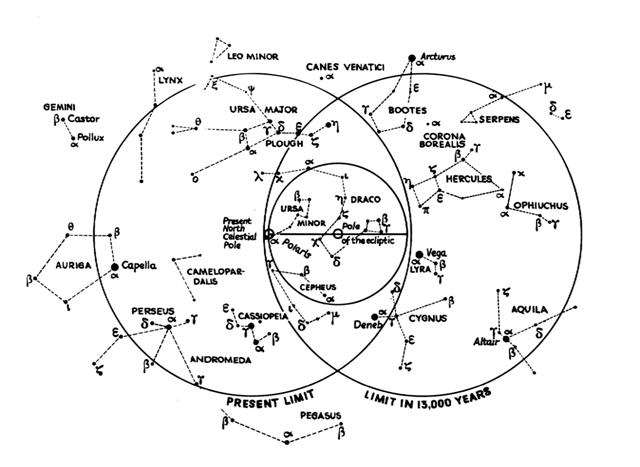 |
|



.jpg)

































.jpg)




